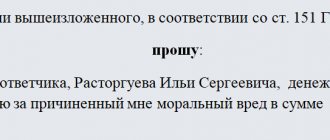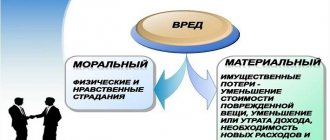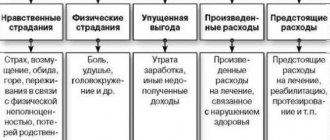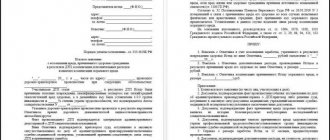Home / Complaints, courts, consumer rights / Litigation
Back
Published: 10/10/2018
Reading time: 5 min
0
200
In the Russian Federation, monetary penalties are provided for violation of personal non-property rights and a number of others. A citizen whose rights have been violated has the right to file a claim to receive monetary compensation for moral damage.
- What is compensation for moral damages?
- Peculiarities
- Under what conditions can size be required?
- How to get compensation for moral damages
What is compensation for moral damages?
Compensation for moral damage is a way for a citizen to protect his rights that have been violated. The amount of this compensation is determined by the court, where the court takes into account the degree of guilt of the offender and the nature of the physical and moral suffering of the victim. The decision is made taking into account the requirements of reasonableness and fairness.
The law provides the following grounds for collecting compensation for causing moral damage:
- violation of the secrecy of a will (Part 2 of Article 1123 of the Civil Code of the Russian Federation);
- violation of the author’s personal non-property rights (Part 1 of Article 1251 of the Civil Code of the Russian Federation);
- violation of consumer rights (from the Russian Federation Law “On Protection of Consumer Rights”);
- violation of rights due to the dissemination of restricted access information or misuse of such information (Part 2 of Article 17 of the Federal Law “On Information, Information Technologies and Information Protection”);
- violation of the rights of a citizen associated with labor discrimination (Part 4 of Article 3 of the Labor Code of the Russian Federation);
- dismissal without legal grounds or in violation of the Labor Code (Part 9 of Article 394 of the Labor Code of the Russian Federation), etc.
When considering disputes, it becomes clear what confirms the fact of causing suffering to the victim and their nature. The amount of compensation, according to Art. 151 of the Civil Code of the Russian Federation, determined by the victim himself.
Comments on Article 1100 of the Civil Code of the Russian Federation, judicial practice of application
Clause 3 of the Resolution of the Plenum of the Supreme Court of the Russian Federation dated December 20, 1994 N 10 “Some issues of application of legislation on compensation for moral damage” contains the following explanations:
Cases of liability for causing moral damage without fault
In accordance with current legislation, one of the mandatory conditions for liability for causing moral damage is the guilt of the causer. Exceptions are made in cases expressly provided for by law.
For example, when:
- harm was caused to the life or health of a citizen by a source of increased danger;
- harm was caused to a citizen as a result of his unlawful conviction, the unlawful use of detention or a written undertaking not to leave as a preventive measure, the unlawful imposition of an administrative penalty in the form of arrest or correctional labor;
- the harm was caused by the dissemination of information discrediting honor, dignity and business reputation (Article 1100 of the second part of the Civil Code of the Russian Federation, entered into force on March 1, 1996).
Paragraph 44 of the Resolution of the Plenum of the Supreme Court of the Russian Federation dated October 18, 2012 N 21 “On the application by courts of legislation on liability for violations in the field of environmental protection and natural resource management” contains the following explanations:
Compensation for moral damages for harm caused by negative environmental impacts
Compensation for moral damage caused to the health of citizens by the negative impact of the environment is carried out regardless of guilt, if such damage was caused by legal entities and citizens whose activities are associated with an increased danger to the environment (Article 1100 of the Civil Code of the Russian Federation).
Clause 18 of the “Review of the practice of courts considering cases on disputes regarding the protection of honor, dignity and business reputation”, approved by the Presidium of the Supreme Court of the Russian Federation on March 16, 2016, contains the following explanations:
The amount of compensation for moral damage in cases of protection of honor, dignity and business reputation
The award of monetary compensation for moral damage in cases of protection of honor, dignity and business reputation must meet the goal for which this method of protecting the non-property rights of citizens has been established. The amount of compensation for moral damage must meet the requirements of reasonableness, fairness and be proportionate to the consequences of the violation.
A study of judicial practice materials has shown that the most common way to protect the personal non-property rights of citizens is to claim compensation for moral damage. Based on Article 1100 of the Civil Code of the Russian Federation, in the event of harm caused by the dissemination of information discrediting honor, dignity and business reputation, the existence of moral damage is assumed (for more details, see paragraph 18 of the review of practice).
In the absence of evidence of guilt of the owners of sources of increased danger in causing mutual harm (regardless of its size), none of them has the right to compensation for harm from each other
In the event of interaction of several sources of increased danger as a result of violation of the Traffic Rules by one of the owners, it is unacceptable to assign responsibility for causing harm (including compensation for moral damage to the recognized victims of the owner of the source of increased danger) on other owners of sources of increased danger, whose fault in this interaction not installed.
If harm to the life and health of citizens - owners of sources of increased danger is caused as a result of the interaction of these sources, then moral damage is compensated depending on the fault of each of them. If there is only the fault of the owner who suffered the damage, it is not compensated. Therefore, if the owner is guilty, whose life and health was damaged, then moral damage is not subject to compensation.
In paragraph 20 of the “Review of the practice of the Constitutional Court of the Russian Federation for the second and third quarters of 2012” the following legal position is given:
In Determination No. 811-O of May 15, 2012, the Constitutional Court revealed the meaning of the regulatory provisions of Articles 1079, 1083 and 1100 of the Civil Code of the Russian Federation.
The legal provisions challenged by the applicant are aimed at regulating the specifics of liability for harm caused by activities that create an increased danger to others, the specifics of taking into account the guilt of the victim and the property status of the person who caused the harm, as well as the grounds for compensation for moral damage.
According to the decision made by the Constitutional Court, the legal regulation established by the challenged legal provisions cannot be considered as not allowing the refusal to award compensation to the relatives of the owner of a source of increased danger (vehicle) who is guilty of a road traffic accident - the interaction (collision) of several sources of increased danger (vehicles) - and who died as a result of it, in the case where the other participant in the collision did not violate the Traffic Rules and was not guilty of the collision. At the same time, the owner of a source of increased danger who is not guilty of a collision of vehicles cannot be held liable for damages, including the obligation to compensate for moral damage to another owner of a source of increased danger who is guilty of a traffic accident, or to his relatives recognized as victims. .
Peculiarities
Moral damage should be understood as suffering that was incurred in the course of actions or inactions that infringe on intangible benefits that belong to a citizen from birth. These include health, honor, business reputation, privacy over family life, etc.
Article 151 of the Civil Code of the Russian Federation states that moral damage may consist of experiences associated with:
- with the death of a relative;
- with the loss of the opportunity to continue the previous active life;
- with deprivation of work;
- with the dissemination of information discrediting honor and dignity;
- causing harm to health , etc.
The legislative act does not directly indicate the possibility of receiving compensation, but this does not mean that the victim does not have the right to compensation for moral damage (paragraph 3, paragraph 4 of Resolution of the Plenum of the RF Armed Forces No. 10).
Moral damage and its types
Neither the Civil Code nor the Criminal Code of the Russian Federation define a detailed list containing types of moral harm. If you combine the entire list of enumeration for all legislative acts that can be defined as types of harm, it will turn out to be endless. According to the law, moral harm is expressed in the infliction of suffering of a physical or moral nature. Moral suffering is suffering caused by emotional experiences such as anger, inferiority, shame, discomfort, despair, depression, irritation, etc.
People may experience similar feelings in the following situations:
- causing significant harm to the physical condition (health) of a person or people dear to him;
- restriction of the free movement of a person carried out by illegal means;
- mutilation, which leaves scars or welts in all visible places, disfiguring the appearance of the victim or people dear to him;
- dissemination of information related to family secrets or medical examination (diagnosis);
- illegal distribution of data from the victim’s correspondence (both via telegraph or mail, and using the telephone and the Internet);
- slander aimed at humiliating human dignity;
- violation of copyright in work, creation, name, photo, etc.;
- loss of one or more relatives;
- loss of employment as a result of a wrongful act;
- restriction on participation in public life.
This list can be continued indefinitely. But according to the law, recovery of moral damages for causing harm occurs only in certain cases, which are clearly prescribed in regulatory legal acts.
Under what conditions can you demand
The main provisions under which it is worth demanding compensation for moral damage:
- harm was caused to the life and health of a citizen;
- illegal bringing to criminal or administrative liability;
- information discrediting the honor and dignity of a citizen was disseminated.
In order for all the conditions to arise for filing a claim for compensation for moral damage, suffering caused by the violation of personal non-property rights, encroachment on intangible benefits, unlawful action or inaction on the part of the tortfeasor, and provable guilt of the violator must simultaneously be present.
Size
The amount of compensation is an estimate. This is due to the fact that the legislation does not have clear criteria for determining the amount of the penalty. The judge makes a decision based on the law on discretion.
The court takes into account the desire of the victim and the offender to resolve the conflict pre-trial. If the plaintiff refuses, the court assigns a minimum amount of moral damages. The judge strives to fully compensate the moral damage to the victim and prevent his unjust enrichment. When making a decision, the court relies on the financial situation of the defendant.
Thus, in case of an accident, the court reduces the amount of compensation claimed by 2-5 times. But in this category, large penalties are often imposed, especially if it is associated with the loss of a relative.
According to sub. 3 paragraphs 1 art. 333.19 Tax Code, state duty is charged . However, in some cases the plaintiff may be exempt from paying it.
State duty
When hearing cases seeking compensation for suffering caused, courts should take into account that moral damage is considered in law as non-property damage, despite the fact that compensation is provided in monetary or other material form. Consequently, the state duty for cases of this kind should be collected in accordance with the provisions of sub-clause. 3 1 paragraph art. 333.19 of the Tax Code, regulating the payment of claims of a non-property nature.
However, it should be taken into account that in a number of cases directly established by law, the plaintiff may be exempt from the obligation to pay the fee.










